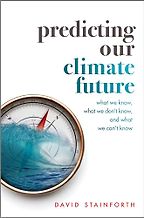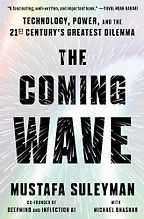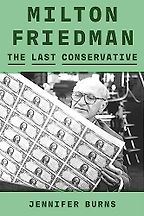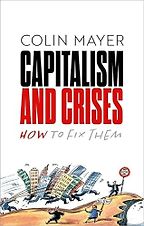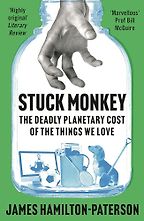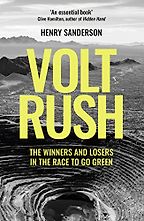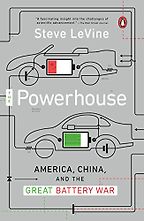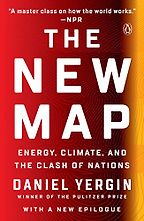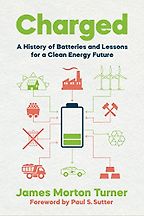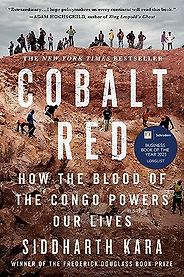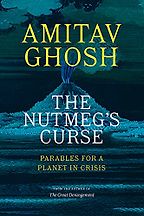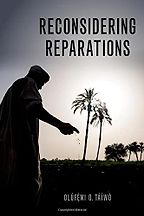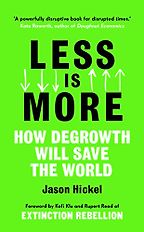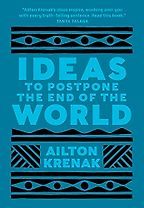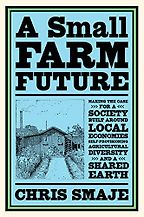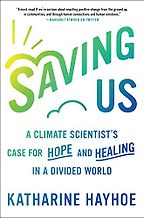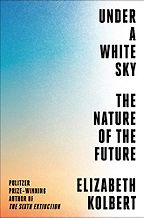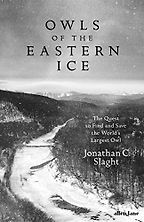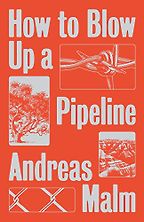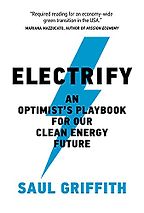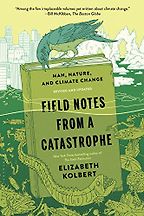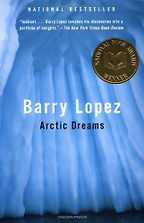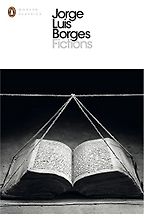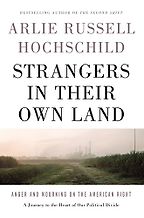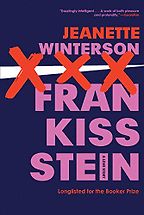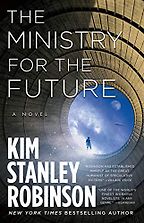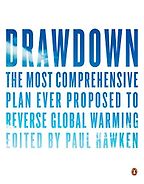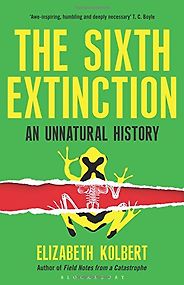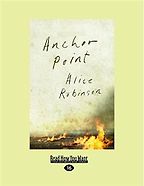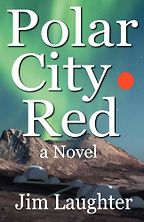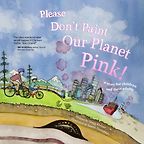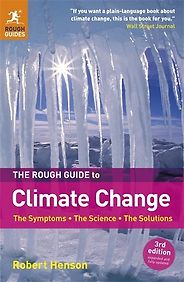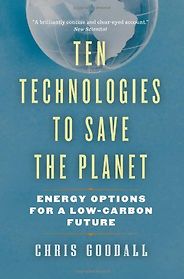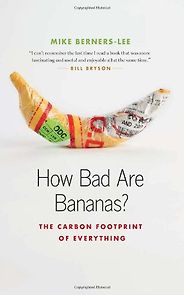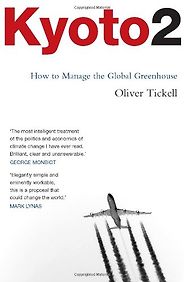Climate Change Books
recommended by scientists, economists, scholars and analysts
Last updated: April 23, 2025
Several eminent scientists and scholars recommend books on climate change. Kate Marvel, of Columbia University and the NASA Goddard Institute for Space Science, talks about climate change and uncertainty. Naomi Oreskes, professor of the history of science at Harvard, talks us through books on the politics of climate change. Roger Pielke Jr, Professor of Environmental Studies at the University of Colorado, looks at books on climate change innovation. John Shepherd, a professorial research fellow in Earth system science at the University of Southampton, chooses his best books on science and climate change.
Climate fiction | Energy Transitions | Renewable Energy | Solar Power | Climate Justice | George Monbiot
-

1
Predicting Our Climate Future: What We Know, What We Don't Know, And What We Can't Know
by David Stainforth -

2
The Coming Wave: Technology, Power, and the Twenty-first Century's Greatest Dilemma
by Michael Bhaskar & Mustafa Suleyman -

3
Milton Friedman: The Last Conservative
by Jennifer Burns -

4
Capitalism and Crises: How to Fix Them
by Colin Mayer -

5
Stuck Monkey: The Deadly Planetary Cost of the Things We Love
by James Hamilton-Paterson
The best books on Economics and the Environment, recommended by Dieter Helm
The best books on Economics and the Environment, recommended by Dieter Helm
If you want to take an economy that’s wholly dependent on fossil fuels and turn it into a low-carbon one it’s going to be expensive, says economist Dieter Helm—and the sooner we face up to that reality the better. He recommends books to help us think through the relationship between economics and the environment, including one that really shines a spotlight on our own, individual behaviour.
-

1
Volt Rush: The Winners and Losers in the Race to Go Green
by Henry Sanderson -

2
The Powerhouse: Inside the Invention of a Battery to Save the World
by Steve LeVine -

3
The New Map: Energy, Climate, and the Clash of Nations
by Daniel Yergin -

4
Charged: A History of Batteries and Lessons for a Clean Energy Future
by James Morton Turner -

5
Cobalt Red: How the Blood of the Congo Powers Our Lives
by Siddharth Kara
The best books on Batteries (for Electric Vehicles and Renewable Energy), recommended by Lukasz Bednarski
The best books on Batteries (for Electric Vehicles and Renewable Energy), recommended by Lukasz Bednarski
As the world turns to electric vehicles and renewable energy to help stave off a climate crisis, there will be huge changes for individuals, industries and even the world geopolitical order. Lukasz Bednarski, a battery analyst, former rare metals trader, and author of Lithium, The Global Race for Battery Dominance, talks us through some of the books that shed light on what’s going on, from the cobalt mines in the Democratic Republic of Congo to the high-tech labs where the latest battery technology is being developed.
-

1
The Nutmeg's Curse: Parables for a Planet in Crisis
by Amitav Ghosh -

2
Reconsidering Reparations
by Olúfẹ́mi O. Táíwò -

3
Less is More: How Degrowth Will Save the World
by Jason Hickel -

4
Ideas to Postpone the End of the World
by Ailton Krenak, translated by Anthony Doyle -

5
A Small Farm Future
by Chris Smaje
The best books on Climate Adaptation, recommended by Ben Rawlence
The best books on Climate Adaptation, recommended by Ben Rawlence
The future is uncertain; perhaps the only thing we do know is that, in terms of the environment and the climate, there is no going back. Ben Rawlence, the author and activist, selects five of the best books on climate adaptation—nonfiction works that might guide our path through a world of rising temperatures, melting ice caps, and shifting forests.
-

1
Saving Us: A Climate Scientist's Case for Hope and Healing in a Divided World
by Katharine Hayhoe -

2
Under a White Sky: The Nature of the Future
by Elizabeth Kolbert -

3
Owls of the Eastern Ice
by Jonathan Slaght -

4
How to Blow Up a Pipeline
by Andreas Malm -

5
Electrify: An Optimist's Playbook for Our Clean Energy Future
by Saul Griffith
The Best Climate Books of 2021, recommended by Sarah Dry
The Best Climate Books of 2021, recommended by Sarah Dry
From the power of the individual to effect change to the large-scale government interventions needed, are we close to a tipping point in our efforts to combat climate change? Just in time to get up to speed for COP26, here’s a selection of the best climate books of 2021, selected for us by historian of climate science, Sarah Dry.
The Best Climate Change Novels, recommended by James Bradley
The best fiction allows us to hold ideas in our heads about time and space and causality and connection that are difficult to articulate in other ways, argues the Australian author James Bradley. It helps its readers engage with dangers and possibilities that are at the very edge of imagination
The best books on Climate Change and Uncertainty, recommended by Kate Marvel
‘When we talk about climate change, we sometimes assume people will be swayed by one more graph, one more coherent argument. But that’s not how people work. More facts don’t change minds, and deeply held views don’t always dictate behaviour.’ How, then, to grapple with a future that ‘might be weirder than we realise’? Kate Marvel, Associate Research Scientist at Columbia University and NASA, recommends an essential reading list for those ready to confront climate change and the uncertainties it brings
-

1
The Sixth Extinction
by Elizabeth Kolbert -

2
Frankissstein: A Novel
by Jeanette Winterson -

3
The Ministry for the Future: A Novel
by Kim Stanley Robinson -

4
Less is More: How Degrowth Will Save the World
by Jason Hickel -

5
Drawdown: The Most Comprehensive Plan Ever Proposed to Reverse Global Warming
by Paul Hawken (editor)
The best books on Global Challenges, recommended by Rowan Hooper
The best books on Global Challenges, recommended by Rowan Hooper
Which are the most pressing global challenges we face today? In How to Spend a Trillion Dollars Rowan Hooper, a senior editor at the New Scientist, makes the case for the ones he considers the most urgent. Here, he recommends books that help illuminate some of those challenges—including the amazing resource that is ‘Project Drawdown’.
-
1
The Great Derangement: Climate Change and the Unthinkable
by Amitav Ghosh -
2
Learning to Die in the Anthropocene: Reflections on the End of a Civilization
by Roy Scranton -
3
Love in the Anthropocene
by Bonnie Nadzam & Dale Jamieson -
4
The Great Persuasion: Reinventing Free Markets since the Depression
by Angus Burgin -
5
The Madhouse Effect: How Climate Change Denial is Threatening Our Planet, Destroying Our Politics, and Driving Us Crazy
by Michael E Mann & Tom Toles
The best books on The Politics of Climate Change, recommended by Naomi Oreskes
The best books on The Politics of Climate Change, recommended by Naomi Oreskes
‘We’re on a path that is going to lead to tremendous destruction and yet most of us are going about our lives as if nothing particularly special is happening.’ The science of climate change is incontrovertible but deniers persist and political and economic solutions continue to be – systematically – frustrated. Time is running out, says Naomi Oreskes
The Best Cli-Fi Books, recommended by Dan Bloom
Fiction that explores issues of climate change is growing at an unprecedented rate today, says the journalist who coined the phrase ‘cli-fi’, Dan Bloom. Here, he picks the five best books of the field, and introduces us to a globally important, underexplored literary genre
The best books on Climate Change, recommended by Duncan Clark
The environment writer suggests the best reading on carbon costs, climate science and technological solutions to save the planet
